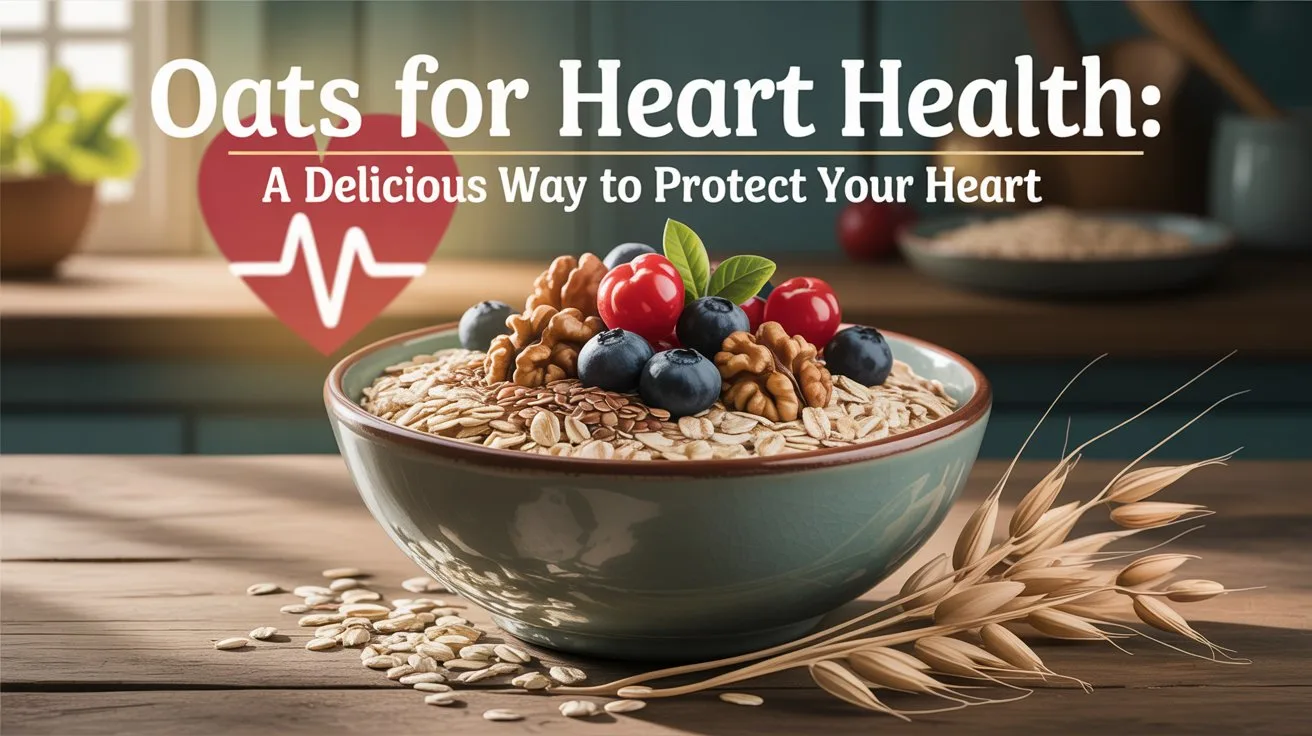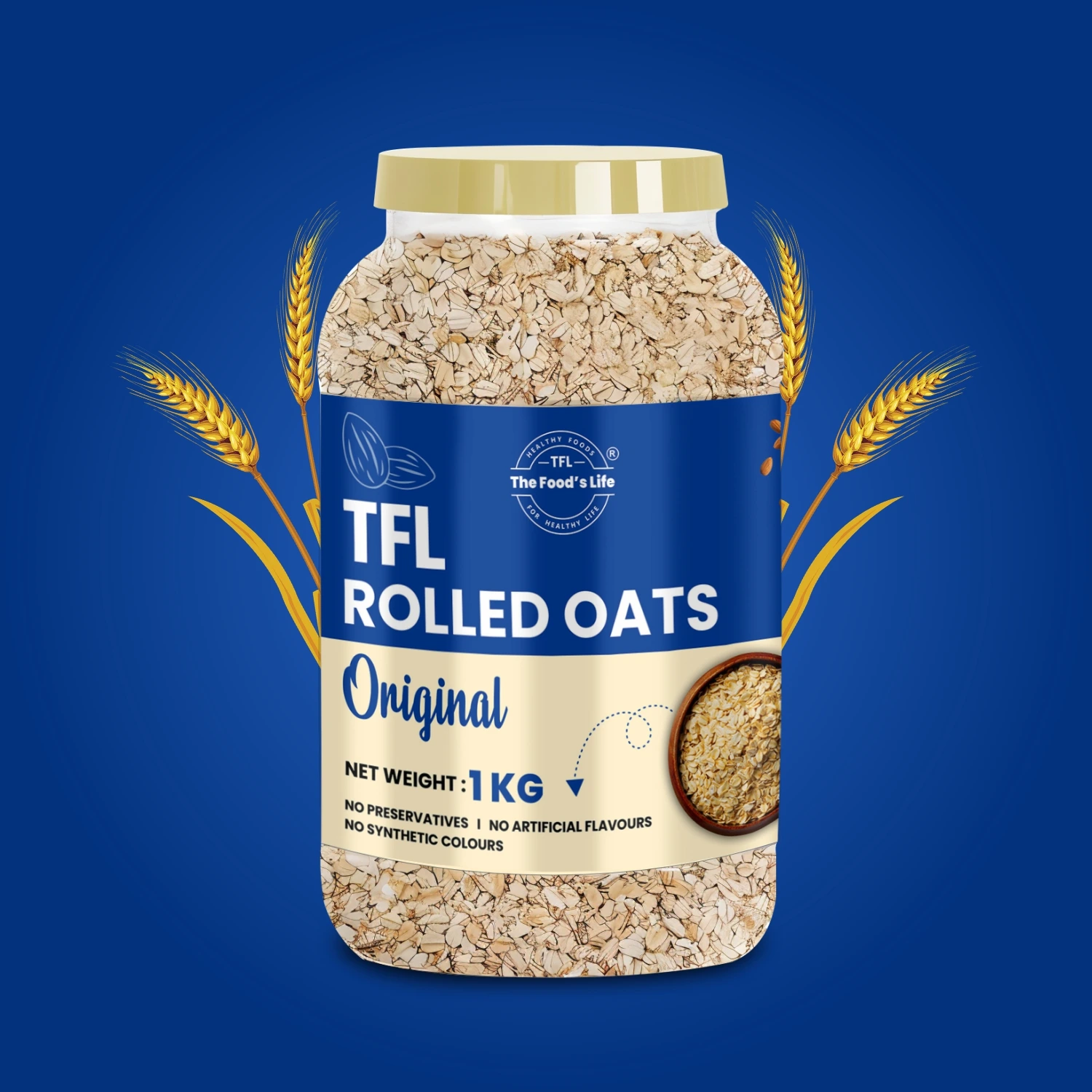Oats are good for heart health, so they make an awesome addition to any diet in a natural, low-cost and effective way that improves cholesterol levels. Oats contain soluble fiber in the form of beta-glucan, and are an effective way to lower LDL (bad) cholesterol, which is very important to maintain a healthy heart.
Factors to examine when consuming heart-healthy oats include improved blood pressure levels of normalcy, circulation, and supporting a clear path to overall heart health.
By grasping the benefits of heart-healthy oats in either oatmeal or oats-based snack options, you can enjoy the tasty goodness while receiving the other health benefits.
Oats, which lower cholesterol to support heart healthy function and are tasty, presents an easy and delicious new way to help manage heart health daily.
The Nutritional Profile of Oats and Their Role in Heart Health
Oats are an ideal heart-healthy option because they are incredibly high in fiber content, especially soluble fiber like beta-glucan. Soluble fiber such as beta-glucan helps lower LDL (bad) cholesterol, which subsequently helps lower the risk of heart disease and other cardiovascular-related diseases. In addition to fiber, oats contain vitamins and minerals, including antioxidants and magnesium which is good for heart health.
Oats contain plenty of complex carbohydrates to stabilize blood sugar, allowing for additional benefits to keep your heart and whole body in good condition. If you eat oats every day, you will be able to sustainably and effectively improve your heart health long-term.
Heart Healthy Oats: What Makes Oats So Beneficial?
- Beta-Glucan Fiber: This type of soluble fiber is really important for lowering cholesterol because it binds to cholesterol in the digestive tract and reduces the amount absorbed.
- Antioxidants: Oats contain avenanthramides, an antioxidant that reduces inflammation and improves blood flow for a healthy cardiovascular system.
- Magnesium and Potassium: Both help regulate blood pressure and function in the heart muscle.
Eating oats may help lower cholesterol levels, help regulate blood pressure, and assist with weight management - all cornerstones for a healthy heart.
Best Oats for Heart Health: Steel-Cut vs Rolled Oats
Choosing the right type of oats can impact the nutritional benefits for your heart. Here's a comparison of steel-cut oats and rolled oats:
Steel-cut oats are less processed, which means they retain more fiber and nutrients. The fiber content is crucial for heart health, as it helps lower cholesterol.
- Rolled oats are pre-steamed and flattened, making them quicker to cook, but they may have a slightly lower fiber content.
Both types are healthy, but steel-cut oats may offer a slight edge when it comes to overall nutrition.
The Role of Whole Grains: How Oats Support Cardiovascular Health
Oats are a whole grain; hence, oats contain all parts of the grain, which is why oats are so nutritious relative to refined grains. Whole grains have a higher nutrient density than refined grains because they contain all three parts of the grain: bran, germ, and endosperm. Whole grains like oats provide:
- Fiber: Important for reducing cholesterol, and stabilizing blood sugar.
- Antioxidants: Protect the heart by reducing oxidative stress and inflammation.
- Micronutrients: In oats, magnesium and potassium can help to regulate blood pressure.
Whole grains like oats have repeatedly been shown to reduce heart disease; whole grains like oats improve cholesterol and reduce inflammation in arteries; help with weight control or weight loss, which is necessary for heart health.
How Beta-Glucan in Oats Plays a Role in Lowering Cholesterol
Beta-glucan, a soluble fiber frequently found in oats, plays a significant role in reducing LDL cholesterol (the "bad" cholesterol) and improving heart health. When ingested, beta-glucan binds to cholesterol and bile acids to create a gel-like state that prevents their absorption into the bloodstream. Ultimately, this process lowers overall total cholesterol (elevated cholesterol is a risk factor for heart disease).
Oats are a good source of beta-glucan, and are one of the best, healthiest natural food sources to help manage cholesterol, and promote heart health.
What is Beta-Glucan and How Does It Work?
- Definition: Beta glucan, is a type of soluble fiber found in oats, barley, and some other grains.
- How It Works: In the digestive system, beta glucan binds to bile acids. Bile acids contain cholesterol and by binding and preserving bile acids, beta glucan encourages their removal from the body, making the liver use up more cholesterol to make additional bile acid. This cycling process ultimately reduces the cholesterol in the bloodstream.
- Scientific Findings: Evidence shows that consuming 3 grams of beta-glucan daily, or just about one bowl of oatmeal, could reduce cholesterol levels by as much as 10%.
With oatmeal included in your diet, you should be able to help your body regulate cholesterol levels on its own, rather than strictly relying on medications.
Heart Healthy Oats: The Power of Fiber in Lowering Cholesterol
Oats are one of the highest sources of fiber - specifically soluble fiber. The most typical fiber found in oats is called beta-glucan, and the health benefits of this particular fiber has been well- documented and supported by research literature. Soluble fiber including beta-glucan can lower LDL cholesterol and promote better heart health.
When you eat oats, the soluble fiber beta-glucan absorbs water and transforms into something that looks like gel in your gut. It is here that the beta-glucan component of fiber traps the cholesterol molecule and when you eliminate that gel-like substance you also eliminate the cholesterol (and improve your total body cholesterol).
As you can imagine, this particular interaction helps lower not only total cholesterol, but plaque build-up, which improves a more stark physical interaction such as atherosclerosis or arterial hardening.
A consistent consumption of oats as a heart-healthy choice has a long-standing effect on lowering cholesterol and improving heart healthy. It helps to keep arteries clear and the heart pumping as it should.
Why Oats are Essential for Cholesterol Control
- Daily Consumption: Eating oats on a daily basis can make a big difference in lowering cholesterol. Having a bowl of oatmeal in the morning can help lower your LDL levels and positively affect heart health.
- Alternative to Medication: Many doctors prescribe medicine for lowering cholesterol. Adding oats to your diet can be a natural and effective alternative to medicine, especially when paired with other dietary changes such as a reduction in saturated fat.
- Heart Health Benefits: Eating oats lowers cholesterol, but they are also full of antioxidants, and they are full of important micronutrients levels, including magnesium and potassium, which help control blood pressure, and limit inflammation in your heart!
The Science Behind Oats and Cardiovascular Disease Prevention
Oats have certainly had their share of claims of being a superfood for heart health, but what do the studies show about oats and heart disease? Research further shows that the beta-glucan soluble fiber in oats is a key factor in lowering cholesterol, more specifically, the LDL cholesterol known to increase heart disease risk. Oats lower LDL and help maintain healthy blood pressure, lowering the risk of heart disease and other cardiovascular disease even further.
Studies support that eating oats on a daily basis can lead to lower cholesterol, reduced inflammation of arterial lining, that supports better overall heart health - all reasons to lower the risk of heart disease.
Oats and Heart Disease Prevention: What Studies Show
- Key Findings: Numerous studies have shown that beta-glucan from oats can lower total cholesterol by up to 10%. This reduction is primarily attributed to the fiber’s ability to bind to cholesterol and help expel it from the body.
- Risk Reduction: According to research published by the American Heart Association, daily consumption of oats can reduce the risk of heart disease by lowering cholesterol levels and preventing plaque build-up in the arteries, which is a major cause of heart attacks and strokes.
- Scientific Consensus: The FDA recognizes that oats and their soluble fiber content can help reduce the risk of heart disease by promoting healthy cholesterol levels. Their official health claim allows the labeling of oats as beneficial for lowering cholesterol.
Studies continually support oats' role in heart health, solidifying their place as a cornerstone of heart disease prevention strategies.
Oats for Heart Health: Scientific Evidence
- The Power of Beta-Glucan: The primary component of oats responsible for heart health benefits is beta-glucan, a soluble fiber. Scientific research consistently highlights beta-glucan's ability to reduce both total and LDL cholesterol, which is a significant factor in the development of heart disease.
- Reduction of Inflammation: Chronic inflammation is a leading cause of cardiovascular disease. Studies suggest that oats can help reduce inflammation in the arteries, further lowering the risk of heart disease.
- Impact on Blood Pressure: Research also points to oats' ability to lower blood pressure. A study published in the Journal of Nutrition found that oats could contribute to lower blood pressure, further supporting their role in cardiovascular health.
Oats have been scientifically proven to not only lower cholesterol but also support healthy blood pressure and reduce inflammation, all vital factors for preventing heart disease.
Long-Term Cardiovascular Benefits of Oats
- Consistent Heart Protection: Regular consumption of oats as part of a healthy diet can have lasting cardiovascular benefits. Studies indicate that over time, oats help maintain optimal cholesterol levels, reducing the burden on the heart and arteries.
- Prevention of Atherosclerosis: Oats help reduce the buildup of plaque in the arteries, which is crucial for preventing atherosclerosis (hardening of the arteries). This protective effect contributes to long-term heart health and reduces the likelihood of heart attacks or strokes.
- Lifelong Benefits: By incorporating oats into daily meals, individuals can experience lasting improvements in heart health, including lower blood pressure, improved cholesterol levels, and a reduced risk of heart disease.
Incorporating Oats into Your Daily Diet: Delicious and Easy Recipes
Adding oats to your daily meals doesn’t have to be difficult. From hearty breakfasts to satisfying lunches and dinners, oats can be easily incorporated into various dishes while offering numerous health benefits for your heart. Here are some simple ways to enjoy oats while promoting heart health.
Heart Healthy Oat Recipes for Breakfast
- Classic Oatmeal: Start your day with a bowl of warm oatmeal topped with fresh berries, chia seeds, and a drizzle of honey. This classic breakfast option is loaded with soluble fiber, especially beta-glucan, which helps lower cholesterol.
- Overnight Oats: For a quick, make-ahead breakfast, combine oats, almond milk, chia seeds, and fruit in a jar and refrigerate overnight. In the morning, you'll have a ready-to-eat, heart-healthy meal full of fiber and essential nutrients.
- Oat Smoothie: Blend oats with almond milk, spinach, banana, and a handful of berries for a nutrient-packed smoothie. This breakfast is rich in antioxidants and heart-healthy fiber that supports cardiovascular health.
Oatmeal Benefits for Heart Health: Easy and Delicious Ways to Enjoy Oats
- Reducing Cholesterol: Oatmeal is a rich source of beta-glucan, which has been scientifically shown to help reduce LDL cholesterol levels. Whether you enjoy it plain or topped with fruit and nuts, oatmeal is a simple, cost-effective way to support heart health.
- Fiber for Digestion: Oats are also an excellent source of dietary fiber, which promotes digestive health by improving gut motility and regularity. Fiber also helps maintain a healthy weight, another factor that contributes to heart disease prevention.
- Blood Sugar Regulation: The soluble fiber in oats slows digestion, which can help regulate blood sugar levels and improve insulin sensitivity. This is particularly beneficial for individuals managing type 2 diabetes or at risk of cardiovascular disease.
Cooking with Oats: Easy and Nutritious Heart-Healthy Meals
- Oatmeal Pancakes: Combine oats with eggs, almond milk, and a little vanilla extract to create a hearty and delicious pancake batter. Top with fresh fruit and a spoonful of almond butter for a heart-healthy meal.
- Oatmeal Muffins: Bake heart-healthy oatmeal muffins by mixing oats with whole wheat flour, bananas, and a touch of cinnamon. These make for a convenient, on-the-go snack that's high in fiber and low in refined sugars.
- Savory Oats: For lunch or dinner, try making a savory oat dish by cooking oats with vegetable broth, adding sautéed vegetables, and finishing with a sprinkle of cheese or nutritional yeast for added flavor. This savory option provides omega-3 fatty acids and antioxidants that support heart health.
FAQs
Q1 Are oats gluten-free by default?
Oats are naturally gluten-free, but they can become contaminated with gluten during processing. If you're following a gluten-free diet, it’s important to choose certified gluten-free oats to avoid cross-contamination.
Q2 Can oats help lower cholesterol?
Yes, oats are rich in beta-glucan, a soluble fiber that has been shown to effectively lower LDL cholesterol. Eating oats regularly as part of a balanced diet can help reduce cholesterol levels and support heart health.
Q3 What is the best type of oats for heart health?
Steel-cut oats and rolled oats are both excellent choices for heart health, as they retain the most nutrients and fiber. Steel-cut oats have a slightly chewier texture, while rolled oats cook faster and are versatile for various recipes.
Q4 How often should I eat oats for heart health?
To gain heart-healthy benefits, aim to include oats in your diet 3–4 times a week. Consuming them regularly helps provide essential fiber, antioxidants, and nutrients that contribute to lowering cholesterol and promoting heart health.
Q5 Can oats help with high blood pressure?
Yes, oats can support healthy blood pressure. The fiber in oats, especially beta-glucan, helps improve blood vessel function and may contribute to lowering blood pressure. Pairing oats with other heart-healthy foods like fruits, vegetables, and healthy fats can further support blood pressure management.
Conclusion: Make Oats a Staple in Your Diet for a Healthy Heart Today!
Oats are an incredibly nutritious, heart-healthy food that can play a vital role in maintaining cardiovascular health. Packed with soluble fiber, antioxidants, and essential nutrients, oats help lower cholesterol levels, regulate blood sugar, and support overall heart function. By incorporating oats into your daily meals—whether in the form of a warm bowl of oatmeal, an oat-based snack, or baked goods—you’re making a simple yet powerful choice for your heart.
Not only do heart-healthy oats provide long-term cardiovascular benefits, but they’re also versatile and easy to enjoy. From breakfast to dinner, oats can be seamlessly integrated into various recipes. So, take control of your heart health today by making oats a regular part of your diet and start reaping the many benefits they offer.






